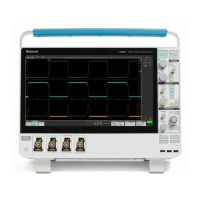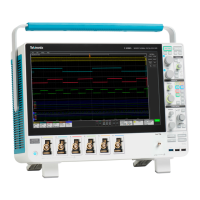Commands listed in alphabetical order
Syntax
TRIGger:{A|B}
:BUS:B<x>:CAN:IDentifier:MOD e
{STandard|EXTended}
TRIGger:{A|B}:BUS:B<x>:CA N:IDentifier:MODe?
Arguments
STandard specifies the standard addressing mode.
EXTended specifi es the e xtended addressing mode.
Examples
TRIGger:A:BUS:B1:CAN:IDen tifier:MODe EXTENDED sets the addressing
mode to extended.
TRIGger:A:BUS:B1:CAN:IDen tifier:MODe? might return
:TRIGGER:A:BUS:B1:CAN:IDE NTIFIER:MODE STANDARD indicating the
addressmodeisstandard.
TRIGger:{A|B}:BUS:B<x>:CAN:IDentifier:VALue
This command s ets the binary address value to be used when triggering on a CAN
bus signal. The trigger condition must be set to IDANDDATA or DATa (using
TRIGger:{A|B}:BUS:B<x>:CAN:CONDition). The bus number is specified
by <x>.
Conditions
Requires the SR-AUTO Triggering and Analysis application.
Group
Trigger
Syntax
TRIGger:{A|B}:BUS:B<x>:CA N:IDentifier:VALue <QStri ng>
TRIGger:{A|B}:BUS:B<x>:CA N:IDentifier:VALue?
Arguments
<QString> is up to 29 bits specifying the binary identifier value. The only
allowedcharactersinthe
QString are0,1,andX.
Examples
TRIGGER:A:BUS:B1:CAN:IDEN TIFIER:VALUE "1011" sets the identifier
value to 1011.
TRIGGER:A:BUS:B1:CAN:IDEN TIFIER:VALUE? might return
:TRIGGER:A:BUS:B1:CAN:IDE NTIFIER:VALUE "XXXXXXXXXXX" indicating
the identifier values is XXXXXXXXXXX.
2-778 MSO54, MSO56, MSO58, MSO58LP Programmer
